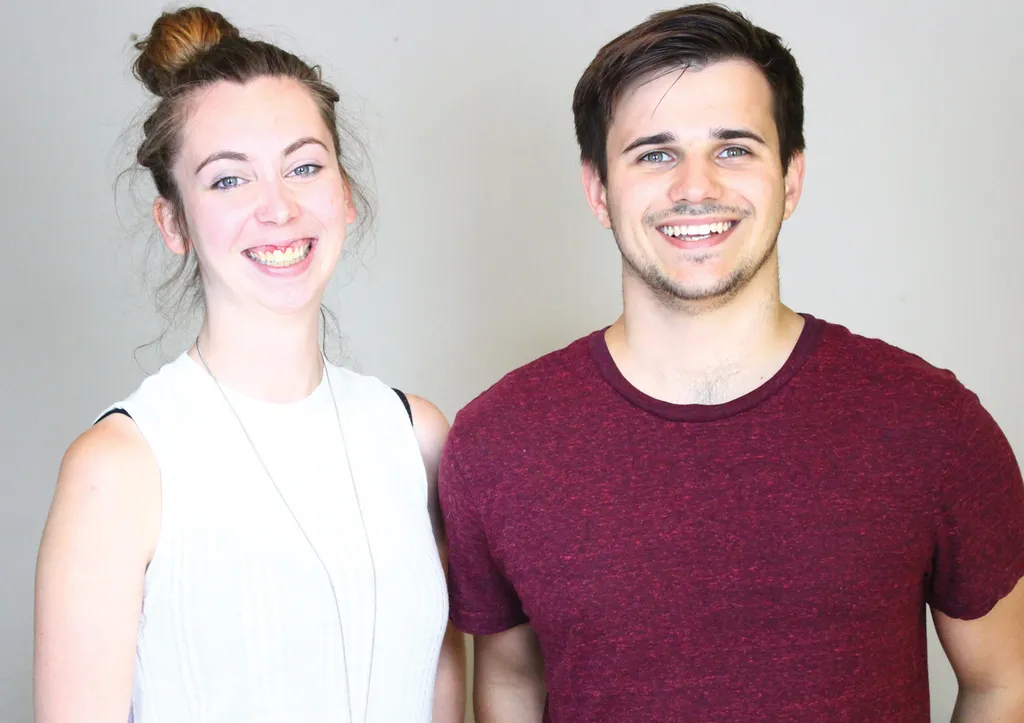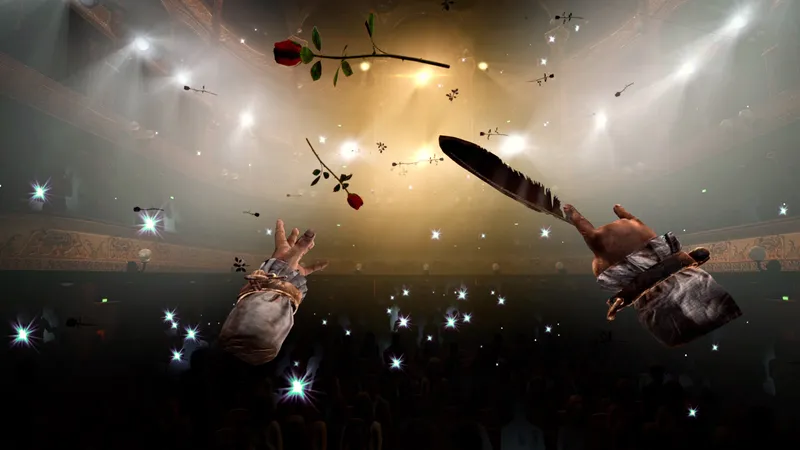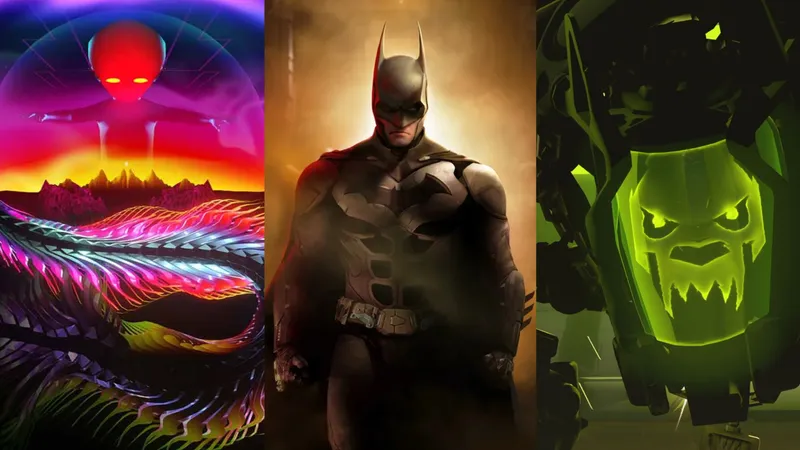When you go to a VR event in the UK there are a few things you can depend upon. Firstly, you’ll probably get lost as you try to find the venue. When you get inside, you’ll probably be greeted with a few bottles of beer, and you’ll want to make sure you get your fair share before the supply runs out. Finally, if you scan the stands and demos inside, you’ll be sure to find Virtual Umbrella making sure rigs are running, power is flowing and everyone’s happy.
These events are the natural habitat of co-founders Samantha Kingston and Albert Millis. They’ve helped put on some of the biggest VR shows in the UK over the past two years along with smaller, more consumer-facing affairs, and that’s only one part of this successful startup’s functions.
Together, these two are filling a gap in the VR industry you might not have known existed. Virtual Umbrella is a VR marketing agency, but one that understands the newness of the medium. They know how to set up shows, who to reach out to for content, and how to promote products to an audience that doesn’t necessarily understand the tech. The idea is to simply help people that might know their way around making VR, but not marketing it. “There’s so many VR developers here doing amazing stuff but they don’t know how to promote it or get it out there and really showcase it,” Millis tells me.
Startup Stage 2
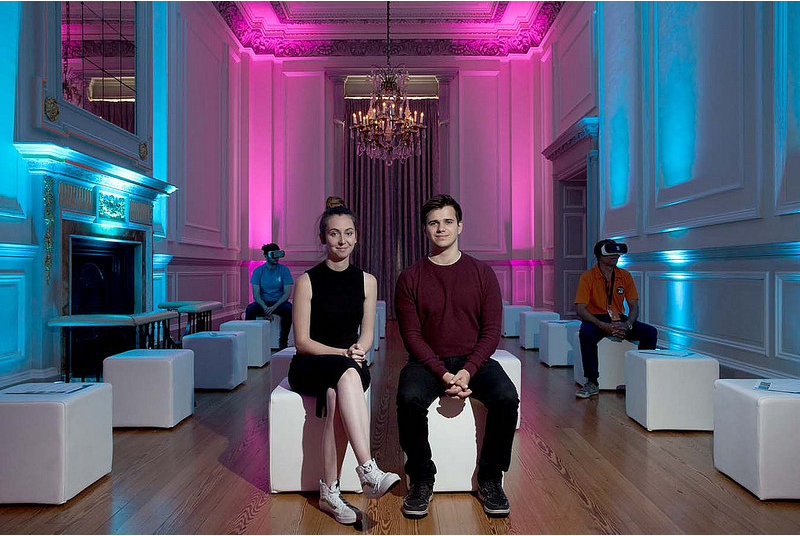
Much of that work translates to these events; the pair have handled shows for clients as big as Nokia and helped showcase well-known VR games like Windlands and Gang Beasts. But on a dull September afternoon, the kind that threatens the end of a long and predictably inconsistent British summer, I find them in a different environment; their first office.
Millis and Kingston have recently moved into their first official working space near their home in Southampton, a two hour train journey South West of London. Unlike many of the startups over in Silicon Valley, they’ve got here purely off of the money they’ve made from the work they slaved over in their first year. There’s no Series A investments or external funding here; Virtual Umbrella is 100% theirs.
The room is a small square with two desks, two PCs, a whiteboard with notes and a calendar crammed with important dates. VR kit is stuffed under tables and packed away in corners, most of it ready to be whisked off to another event. It’s far from a palace, but it shows remarkable growth for a company consisting of two young people that officially started back March 2015 in an industry that barely has its first major consumer products out the door.
And it’s only going to grow. “We feel that we’re in that position now where we’re transitioning from being a startup to being an actual functioning company,” Kingston says. “To the point where you hire more people in, having the traditional typical things you should have as a company.
“Our baby is turning into a toddler.”
I didn’t visit Virtual Umbrella to get tips on starting up a VR company, but they’ve clearly done something right, and their story shows it. Huddled round Kingston’s desk, we talked about those steps right from the start.
Support Yourself And Network Like Hell

If you’d asked these two if they thought Virtual Umbrella would go this far this fast back then, they’d have probably laughed at you. At the time, Millis was working for a B2B tech PR company whilst finishing a degree, and Kingston was freelancing events work for VR companies after parting ways with The Assembly developer nDreams, where she had had her first taste of VR.
“I thought it would be a great idea to start a marketing agency doing something and when you’re marketing, there’s a lot of things that it’s not easy to get excited for,” Millis tells me when I ask how the company came to be. It wasn’t until he spent some time working at Opposable, the Bristol-based company behind the 2015 South West VR event that look place that March (better known as VR World Congress when it returned in 2016), that he thought VR might give him that excitement. Kingston was there too, and took advice to turn her freelancing into her own business. The pair wanted to work together. The seeds of Virtual Umbrella had been sewn and, later that month, they began to grow.
“That first month we had the company official in The Harlington theatre, which is where I used to work,” Kingston recalls. I can only imagine the conversations Millis and Kingston would have had with friends and family when they told them they were betting it all on a new technology that they probably hadn’t heard much about. They soon learned how much work it was going to be.
At first, Millis was continuing to work on his degree and other jobs to keep the company going as Kingston traveled to events and met with contacts to “get the momentum up.” Both describe that period as “stressful” given the lack of funding. “But that was good because it was getting our name out there,” Kingston says. “We were trying to build our online presence and trying to build a bit of a brand.”
Don’t Run Before You Can Walk
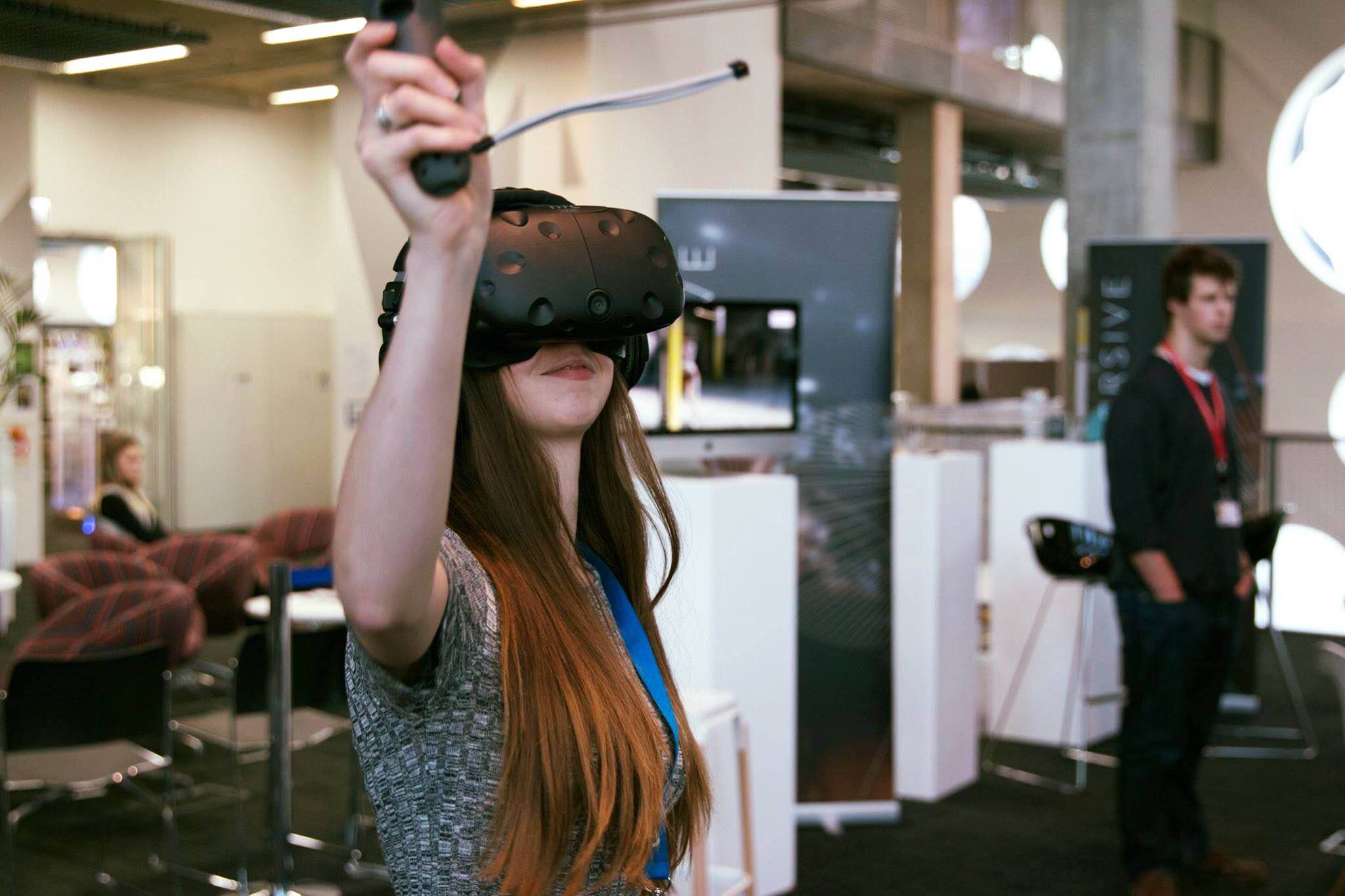
“At the same time we were planning our first VR in a Bar which happened in late June last year.” Previously handled internally at London-based pub, The Loading Bar, VR in a Bar was a simple evening where people could go heads-on with VR at a time where headsets were much rarer than they are now. After the first event, Kingston was approached to handle future evenings. It was one of the first tasks for this new company.
But, even with early jobs in hand, Millis thinks the pair fired a bit early with starting up the company. “We did sort of the slightly foolish thing of incorporating and legitimizing our idea before we had a formal plan in place,” he said. “But that was semi-due to the fact we were really keen, and another part due to the fact that we knew we wanted to call it Virtual Umbrella. We knew that’s what we wanted but we were scared of making it formal. And then another one of my housemates said “If you don’t make it formal in the next day I’m going to buy the business name.””
The name is somewhat of a joke. Millis originally wanted to call it the Umbrella Corporation based on the Resident Evil franchise. From that foundation they settled on Virtual Umbrella, which means that company cover anything that falls under that umbrella, be it VR, AR or MR. It might also mean they’re one day to blame for the zombie apocalypse.
Hustle Hard
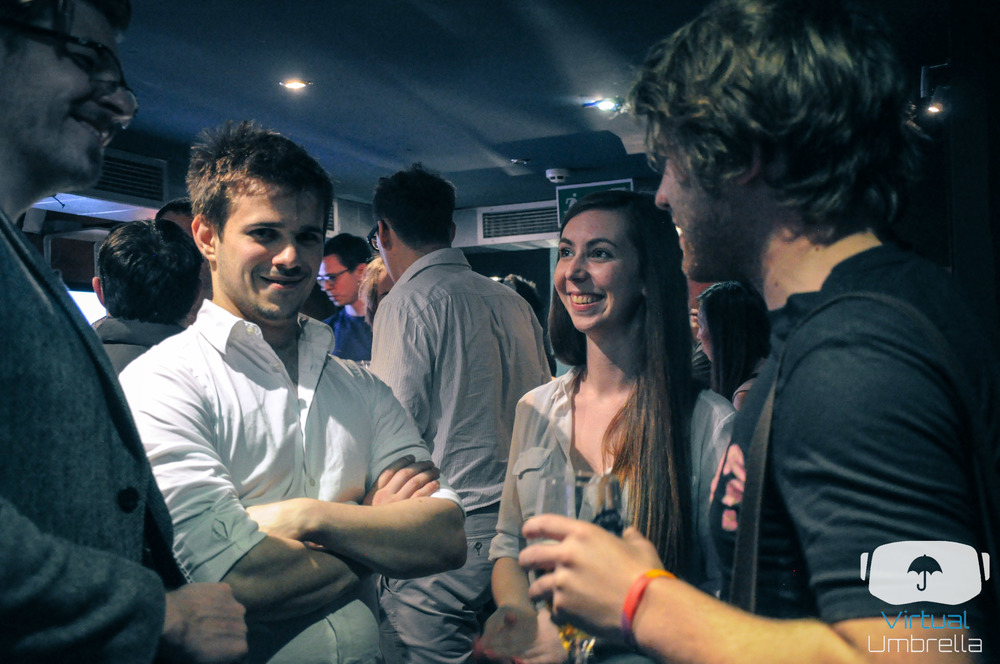
While a handful of smaller jobs helped occupy Kingston and Millis in the first few months, both have the same answer when I ask them where things started to change: E3. The 2015 iteration of the game industry’s biggest show was big for VR, with Oculus revealing more about the consumer version of the Rift and Sony providing hands-on with PlayStation VR, then known as Project Morpheus. It was an event Virtual Umbrella couldn’t afford to miss and, with the help of nDreams, they didn’t.
As exhibitors at the show, the developer got its former employee and Millis passes. “And then we hustled, majorly,” Kingston says, recalling last year’s trip to LA. “Everyone told us that you’re not going to make money in your first year and I think we kind of accepted that. And then when we went to E3 we met a lot of people. We met a couple of people who were our first clients.”
One such client was Merge VR, the mobile-based VR headset that’s made of a durable foam. Virtual Umbrella helped evangelize the kit, which became the first VR headset to be sold in the UK’s biggest gaming retailer, GAME.
From there, client work has grown into something much more considerable. Earlier this year the pair helped host Ravensbourne University’s VRUK, a two day festival in London that focused on filmmaking. Millis describes it at the company’s first “big gig”, and receiving the paycheck is his proudest moment so far. “That was the jump-off point,” he says. “From that day we didn’t have any external income, it was all on us.”
Get Recognized And Give Back
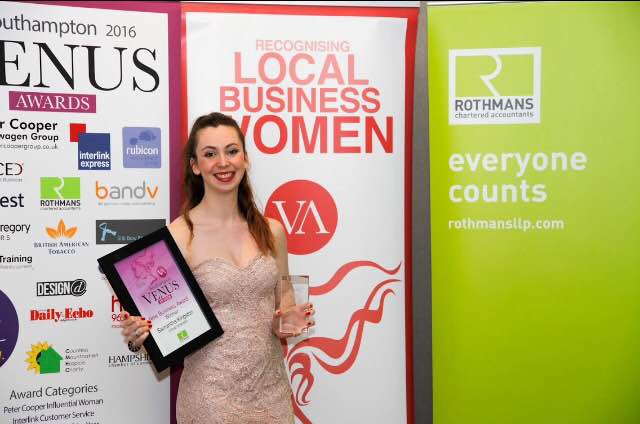
While Virtual Umbrella is already impressively successful from a business standpoint, it’s also become well-known for helping push VR in other ways, most notably diversity. Though she might scoff at the idea, Kingston has become one of the figureheads for women in VR. It’s a role she says “fell into her lap.”
“I’m quite active online, especially in the UK where there are not many women in VR,” she explained. “There’s a good handful of us and they’re from developers to artists to people like me who do marketing. But I found that when I was going to events and doing any talks there was never a good kind of representation of women. It’s not always a bad thing because women, if they’re CEOs, are busy.”
Together with Sarah Jones, Kingston helps run VR Girls UK, a group that aims to help the representation of women in the UK VR scene. That involves making sure it’s not just “all white, bald men” speaking at events and “making sure everyone’s getting their fair shot.” As a result, she’s become something of a role model to a lot of women both in and out of VR, which is reinforced by the amount of awards the pair have.
At their flat in Southampton, Millis and Kingston have a small stand where a handful of trophies sit. To name a few: Kingston won the award for New Business at the 2016 Venus Awards for Women (regionals and nationals), and the pair took home the prize for Best VR Marketing & PR Specialists at the TMT Awards. Both have been featured in MCV’s 30 Under 30 over the past two years and MCV also gave Kingston the Unsung Hero nod at its Women in Games Awards.
How did all of that come about? “It just sort of happened,” laughs Kingston, reflecting on the overwhelming recognition the company and its founders have received.
The Signs of Success
There aren’t many VR companies that have had the whirlwind kind of year and a half that Virtual Umbrella has experienced, unless they’ve been bought by Facebook. What Millis and Kingston have achieved in that time is remarkable, and now that VR is finally in its consumer phase they hope there’s plenty more to come. Both of them admit they’ve made a “massive sacrifice” to get to where they are now, and anyone prepared to make it in the VR industry should be ready to do the same.
Virtual Umbrella is proof that you don’t need Silicon Valley’s millions to make your VR dream come true. True, their work isn’t as costly as game development, but this is a company that started out with nothing and has got to where it is through hard work alone. The result is a company that they entirely own, that has the DNA of its founders engraved on it.
“After such an exciting year, we are super excited to see what happens in 2017,” Kingston says. “There are some great VR UK based companies — Psytec Games, Breaking Fourth, Make Real, Curiscope, Wolf and Wood — that we are looking forward to see what they get up too next year in the industry, so make sure you go check them out too. We are super proud to be a part of such a great UK community.”
The VR scene in the UK is indeed strong. These two are partly to thank for it, and it shows. “Being in a position where people ask your advice is a good point to be in a business because it means people rely on you or are interested in your opinion,” Kingston says at one point. “They respect you, basically.”
That respect is well earned.

